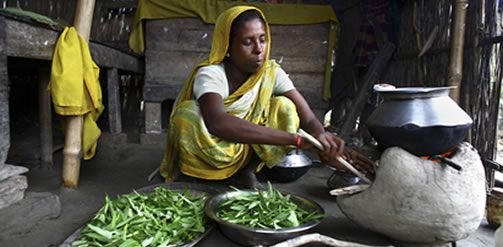 Lyla Mehta, STEPS Centre water & sanitation theme convenor, is heading a team writing the report on Water and Food Security to the Committee of World Food Security (CFS).
Lyla Mehta, STEPS Centre water & sanitation theme convenor, is heading a team writing the report on Water and Food Security to the Committee of World Food Security (CFS).Water for all, provided in an equitable and sustainable way, is central to global justice for poor women and men. It has a particularly important role in food security through its multiple impacts on health, agricultural production and food processing. Yet despite successive global declarations and efforts, hundreds of millions still suffer from lack of access to water for drinking, cooking, agricultural irrigation and food production at domestic and industrial levels.
Simplistic portrayals of water ‘crises’ have often led to misunderstandings on the nature of the problem and how to address it. The result has been a failure to centralise the needs and interests of the poor and marginalised within different solutions. In recognition of this, and in follow-up of major international events such as Rio+20 and the World Water Forum, the Committee of World Food Security (CFS), in its 40th session, requested the High Level Panel of Experts on Food Security and Nutrition (HLPE) to prepare a report on Water and Food Security for its 42nd session in 2015. Following the open call for experts, the Steering Committee of the HLPE constituted a project team to write the report, led by IDS Fellow Lyla Mehta.
HLPE on water and food security and the CFS
Through a food security lens, the HLPE has been requested to focus its analysis on water for agricultural production and food processing, taking also into account gender-related aspects. It is also expected to, from a food security perspective, assess the impacts of water management practices on food security, including water usage for agricultural production, food processing and other ways of consumption and also also consider in particular issues related to the sustainability of irrigation systems, the salinization of agricultural land and the reduction of the quality of the ground water. On this basis, it will give appropriate recommendations so as to improve water and food security policies, as well as coordination among the different fields and actors at all levels, with a long-term perspective.The Committee on World Food Security (CFS), established in 1974, is the key intergovernmental forum addressing global food security and nutrition. Following the food crisis of the 2007-08, it was reformed to be a more inclusive and multi-stakeholder body with strong participation of civil society representing the rights of small-scale producers and workers alongside governments, donor agencies and private sector actors. The CFS created the HLPE to help them in identifying the problems and to bring expert knowledge to the attention of the CFS.
As directed by the CFS Plenary and Bureau, the HLPE will:
- Assess and analyse the current state of food security and nutrition and its underlying causes.
- Provide scientific and knowledge-based analysis and advice on specific policy-relevant issues, utilising existing high quality research, data and technical studies.
- Identify emerging issues, and help members prioritise future actions and attentions on key focal areas.
Project team and the report on Water for Food Security
The project team will meet for the first time at IDS this week. The team comprises:- Lyla Mehta (Team Leader, STEPS Centre/IDS)
- Oscar Cordeiro-Netto (University of Brasilia)
- Theib Oweis (Integrated Water and Land Management Program at the International Center for Agricultural Research in the Dry Areas)
- Claudia Ringler (International Food Policy Research Institute)
- Barbara Schreiner (Pegasys Institute)
- Shiney Varghese (Institute for Agriculture and Trade Policy).
The report will build on the work done by the Water Justice Programme and the STEPS Centre which have consistently sought bring together the food, agriculture, water, sanitation, and health domains against the backdrop of growing challenges of food and resource crises, rapid urbanisation and climate change. Our work seeks to enhance equity, social and gender justice and sustainability in the water domain by critically examining the politics and pathways of water and sanitation policy and practice through interdisciplinary research on scarcity, power, access, rights to and control over water and other resources.
This article first appeared on the Institute of Development Studies website.
